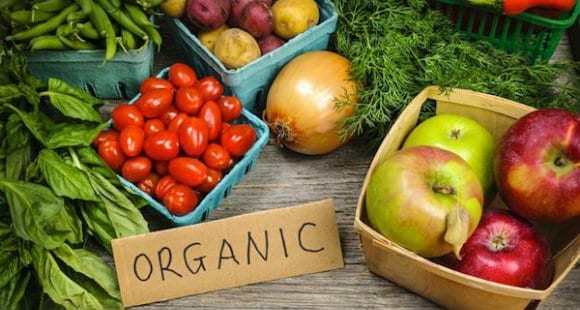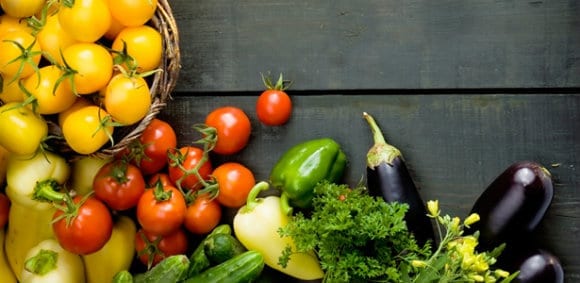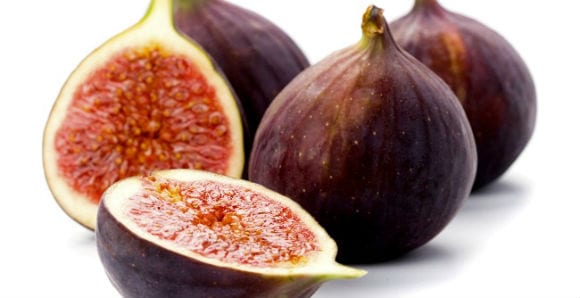
Written by Christopher Tack
Organic Food & Potential Benefits
Organic foods are a consistently growing industry in the health and fitness world (1). Exposure to the potential positives of consuming organic foodstuffs encourages those with a keen interest in both their own health and the environment, to switch to “organic”. However, are these claims founded in the available science or are these messages just the stuff of alternative lifestyle myths? This article will elaborate on what it means to go “organic” and the potential benefits.

What Are “Organic Foods”?
Despite a decade of growing popularity in the organic food world, there remains confusion in what this term means (2) with different interpretations used in various contexts (1). This is confusion we would like to put to bed! Most people would correctly associate this ethos with the avoidance of chemical use in food production, but remain unfamiliar with the organic farming standards and stipulations upon which this ethos is borne (3-5).
Organic food is partially defined as the product of farming which avoids synthetic chemicals as fertiliser, pesticides and growth agents (6). However, it is also based upon the Compendium of UK Organic Standards, which includes the production systems designed and used to produce organic “food of high nutritional quality by using management practices which avoid agrochemical inputs and which minimise damage to the environment and wildlife” (7). This then extends the avoidance of chemicals to land used for growing crops and the foods/ medicines given to animals being reared for consumption. In the UK this means all farms and production facilities need to meet agreed standards upon which they are inspected before registration and approval as a supplier of organic food (8).

Who Eats “Organic Foods”?
It is estimated that in Europe sales of organic food will increase 20% per year (8). Whilst recent data is unavailable studies from a decade ago showed that back in 2002 the global market for organic food was estimated to be approximately £16 billion (9). In the UK the organic food market is now considered mainstream rather than a niche market (10).
Generally, organic food consumers are older females with children (3, 11-15) but that even younger consumers show positive attitudes towards organically grown food (16). It is suggested that to some extent younger people are priced out of buying “organic” by the higher premiums on these foods (1).
It is also found that the choice to consume organic foods is a part of distinct ideology and value system that affects a person’s attitudes and beliefs (14). Specifically, values such as altruism (selfless concern for others), ecology (harmony to the environment and sustainability) and spirituality are commonly connected to the organic food ideology (17-20). As such organic food diets often are related to alternative lifestyles, such as environmentalism (15).
A final characteristic of organic food consumers is their elevated belief in their own responsibility to control their health and prevent ill health (18). People who are concerned with exercise and optimal nutrition will be concerned with staying up to date in health-related research (14) and find health to be an essential motive for purchasing organic food (19,21).

Why Choose Organic Foods?
We have now established what “organic food” is, and whom may be currently the main consumers of these foodstuffs. However, what about for those of us who usually purchase non-organic foods but are interested in improving our health and using diet (alongside exercise) to prevent against disease. Read on, as I break down the main reasons why you should be choosing to “go organic”.
Reason #1 Organic = Healthy
As suggested a large majority of the available research shows that the primary reason people choose to buy organic food is for their health (21-23). Some studies even show that consumers find organic food is more nutritious (5,24).
Whilst studies do not specifically indicate that ALL organic food is better than standard food, there are certainly some apparent benefits. For example, in Italian organic buffalo milk and mozzarella cheese, higher levels of health-promoting compounds such as alpha-linoleic acid, conjugated linoleic acid, vitamin E and beta-carotene (25) are found (compared to non-organic versions). This is supported by a different study from Denmark which shows that 7 out of 10 samples of organic milk had higher levels of vitamin E, and also a higher rate of beta-carotene (26). Additionally, the proportion of polyunsaturated fatty acids (PUFAs) to monounsaturated fatty acids in organic milk was higher, with a lower ratio of n-6 to n-3 PUFAs (27).
Alongside these improvements in the products of organically reared animals, benefits have also been found in organically grown crops. For example, organically produced vegetables have more vitamin C (8), as well as lower rates of nitrates (28). These results have been reproduced by other authors (29). There seems across studies a trend for higher nutrient levels in organic crops, particularly in potatoes and leafy vegetables (30). There is also evidence that whilst protein content in organic legumes and cereals, the protein provided is of a better quality with more essential amino acids available (30).

Reason #2- Organic = No chemicals
Another reason people choose organic foods over conventional foods is to avoid chemicals used in non-organic food production (24,31-32). Specifically, the use of synthetic pesticides is a concern due to its association with unknown effects on health (33). Obviously, the strict regulations of organic farming aim to prevent the potential hazards posed by exposure to such chemicals (6).
The presence of pesticide residues in organic and conventional products have been examined, with conventional foods having a higher rate (34-35). The negative effects of which have also been postulated. For example, male organic food consumers have been shown to have a higher sperm count than those consuming regular food (36-37). Further studies have examined further and shown that pesticide exposure is associated with reproductive impairments and male infertility (38-39).
Reason #3- Organic = Safe
As an extension of Reason #2 we can investigate further how organic foods can prevent other issues of danger for consumers. The main issues spoken about commonly are large scale farming crises such as the bovine spongiform encephalopathy (BSE) and foot and mouth disease events which occurred in Europe a few years ago. These issues are related to conventional livestock production methods where animals are fed animal flour (waste animal meat and bone), and in the organic farm environment these risks are removed as only organic food is provided to the animals.
Regulation of farming practices can prevent the dangers of food irradiation and genetic modification, leaving organic food a very tempting option for many consumers.

Reason #4- Organic = Quality
Unfortunately, a large amount of the research which compares the quality of organic foods vs regular foods is flawed by methodological issues in the experiments undertaken (6). However, as suggested previously data does indicate higher levels of nutrient contents in organically grown crops (41-42), which may be due to dilution of nutrient content is conventional crops which have a higher water content (29,34).
Additionally, in organic pig farms the removal of synthetic amino acid supplements from the pig’s diets, shows a greater amount of intramuscular fat in the animals, which is deemed a very positive aspect of eating quality in the meat (43). Indicating that both organically grown crops and organically reared animal meats may show greater food quality characteristics compared to normal products.
Reason #5- Organic = Tasty
Whilst in no ways conclusive, there is some evidence that organic foods show a difference in taste compared to conventional products; with taste being an important criteria for organic food consumers to consider (13-14,16). In one study where a blind taste test was set up, a group of subjects were asked to compare the taste of organic orange juice and non-organic orange juice (44). Incredibly, the across the board participants found that the organic orange juice tasted better than its conventional counterpart, perhaps indicating that organic foods are not only more nutritious but also tastier than their rivals.

Take Home Message
There you have it, organic foods which are such a focus for the health and nutritional market seem to be more than just a dietary myth. Organic foods are not only healthy but also are better for the environment and just as good if not better than conventional foods when it comes to quality and taste. Additionally, consumption of organic food products reduces your risks of exposure to chemicals and disease, further benefiting your health. Many reasons why going “organic” may be the best thing for you.
- Hughner, R. S., McDonagh, P., Prothero, A., Shultz, C. J., & Stanton, J. (2007). Who are organic food consumers? A compilation and review of why people purchase organic food.Journal of consumer behaviour, 6(2?3), 94-110.
- Chryssochoidis G. 2000. Repercussions of consumer confusion for late introduced differentiated products. European Journal of Marketing 34(5/6): 705–722
- Davies A, Titterington A, Cochrane C. 1995. Who buys organic food? A profile of the purchasers of organic food in Northern Ireland. British Food Journal 97(10): 17–23.
- Harper GC, Makatouni A. 2002. Consumer perception of organic food production and farm animal welfare. British Food Journal 104(3/4/5): 287–299.
- Hill, Helene, and Fidelma Lynchehaun. "Organic milk: attitudes and consumption patterns."British Food Journal 104, no. 7 (2002): 526-542.
- Kouba, M. (2003). Quality of organic animal products.Livestock Production Science, 80(1), 33-40.
- DEFRA (Department for Environment, Food and Rural Affairs) (2006) Compendium of UK Organic Standards, September 2006. Available at: http://www.defra.gov.uk/farm/organic/standards/pdf/ compendium.pd
- Williamson, C. S. (2007). Is organic food better for our health?.Nutrition bulletin, 32(2), 104-108.
- Fitzpatrick M. 2002. Food scares drive organic sales in Japan. Food Traceability Report 2(3): 11.
- Palmer A. 2001. Organic food. Economic Review 19(1): 2–11.
- Food Marketing Institute. 2001. Organic shoppers may not be who you think they are. Washington, DC: The Food Marketing Institute Report.
- Thompson GD, Kidwell J. 1998. May. Explaining the choice of organic produce: cosmetic defects prices, and consumer preferences. American Journal of Agricultural Economics 80(2): 277–287.
- Roddy G, Cowan C, Hutchinson G. 1996. Irish Market. British Food Journal 96(4): 3–10.
- Schifferstein HNJ, Oude Ophuis PAM. 1998. Healthrelated determinants of organic food consumption in the Netherlands. Food Quality and Preference 9(3): 119–133.
- Cicia G, Del Giudice T, Scarpa R. 2002. Consumers’ perception of quality in organic food: a random utility model under preference heterogeneity and choice correlation from rank-orderings. British Food Journal 104(3/4/5): 200–213
- Magnusson MK, Arvola A, Hursti U, Aberg L, Sjoden P. 2001. Attitudes towards organic foods among Swedish consumers. British Food Journal 103(3): 209–227.
- Grunert SC, Juhl HJ. 1995. Values, environmental attitudes, and buying of organic foods. Journal of Economic Psychology 16(1): 39–62
- Makatouni A. 2002. What motivates consumers to buy organic food in the UK? Results from a qualitative study. British Food Journal 104(3/ 4/5): 345–352.
- Zanoli R, Naspetti S. 2002. Consumer Motivations in the Purchase of Organic Food. British Food Journal 104(8): 643–653.
- Fotopoulos C, Krystallis A, Ness M. 2003. Wine produced by organic grapes in Greece: using means-end chains analysis to reveal organic buyers’ purchasing motives in comparison to the non-buyers. Food Quality and Preference 14(7): 549–566
- Tregear A, Dent JB, McGregor MJ. 1994. The demand for organically grown produce. British Food Journal 96(4): 21–25.
- Huang CL. 1996. Consumer preferences and attitudes towards organically grown produce. European Review of Agricultural Economics 23(3–4): 331–342.
- Hutchins RK, Greenhalgh LA. 1995. November/ December Organic confusion: sustaining competitive advantage. Nutrition & Food Science 6: 11–14.
- Jolly DA. 1991. Determinants of organic horticultural products consumption based on a sample of California consumers. Acta Horticulture 295: 41–148.
- Bergamo P, Fedele E, Iannibelli L et al. (2003) Fat-soluble vitamin contents and fatty acid composition in organic and conventional Italian dairy products. Food Chemistry 82: 625–31
- Nielsen JH & Lund-Nielsen T (2005) Healthier organic livestock products; antioxidants in organically and conventionally produced milk. Plenary session from the Organic Farming, Food Quality and Human Health Conference, 6–9 January 2005. Related to the Quality Low Input Food (QLIF) project.
- Lunn J & Theobald HE (2006) Briefing paper: The health effects of dietary unsaturated fatty acids. Nutrition Bulletin 31: 178–224
- Woese K, Lange D, Boess C et al. (1997) A comparison of organically and conventionally grown foods– results of a review of the relevant literature. Journal of the Science of Food and Agriculture 74: 281– 93.
- Worthington V (1998) Effect of agricultural methods on nutritional quality: a comparison of organic with conventional crops. Alternative Therapies in Health and Medicine 4: 58–69.
- Magkos F, Arvaniti F & Zampelas A (2003) Organic food: nutritious food or food for thought? A review of the evidence. International Journal of Food Sciences and Nutrition 54: 357–71
- Ott SL. 1990. Supermarkets shoppers’ pesticide concerns and willingness to purchase certified pesticide residue-free fresh produce. Agribusiness 6(6): 593–602
- Wilkins JL, Hillers VN. 1994. Influences of pesticide residue and environmental concerns on organic food preference among food cooperative members and non-members in Washington state. Journal of Nutrition Education 26(1): 26–33.
- Hammit JK. 1990. Risk perception and food choice: an exploratory analysis of organic versus conventional produce buyers. Risk Analysis 10(3):367–374.
- Lecerf, J. M. (1995). L'agriculture biologique. Intérêt en nutrition humaine?.Cahiers de nutrition et de diététique,30(6), 349-357.
- Maruejouls, B., & Goulard, F. (1999). Résidus de pesticides dans le lait.Des résultats encourageants pour les produits de l’agriculture biologique. Alter Agri, 37, 10-13.
- Abell, A., Ernst, E., & Bonde, J. P. (1994). High sperm density among members of organic farmers' association.The Lancet, 343(8911), 1498.
- Jensen, T. K., Giwercman, A., Carlsen, E., Scheike, T., & Skakkebaek, N. (1996). Semen quality among members of organic food associations in Zealand, Denmark.The Lancet, 347(9018), 1844.
- Oliva, A., Spira, A., & Multigner, L. (2001). Contribution of environmental factors to the risk of male infertility.Human Reproduction, 16(8), 1768-1776.
- Ratcliffe, J. M., Schrader, S. M., Steenland, K., Clapp, D. E., Turner, T., & Hornung, R. W. (1987). Semen quality in papaya workers with long term exposure to ethylene dibromide.British journal of industrial medicine, 44(5), 317-326.
- Lu, C., Barr, D. B., Pearson, M. A., & Waller, L. A. (2008). Dietary intake and its contribution to longitudinal organophosphorus pesticide exposure in urban/suburban children.Environmental health perspectives, 116(4), 537
- Hornick, S. B. (1992). Factors affecting the nutritional quality of crops.American Journal of Alternative Agriculture,7(1-2), 63-68.
- Smith, B. L. (1993). Organic foods vs. supermarket foods: element levels.Journal of applied nutrition,45(1), 35-39.
- Sundrum, A., Bütfering, L., Henning, M., & Hoppenbrock, K. H. (2000). Effects of on-farm diets for organic pig production on performance and carcass quality.Journal of animal science, 78(5), 1199-1205.
- Fillion L, Arazi S. 2002. Does organic food taste better? A claim substantiation approach. Nutrition and Food Science 32(2): 153–157
Our articles should be used for informational and educational purposes only and are not intended to be taken as medical advice. If you're concerned, consult a health professional before taking dietary supplements or introducing any major changes to your diet.

Casey Walker is an experienced sports nutrition new product development technologist. He holds a Bachelor of Science in Sports and Exercise Science and a Master of Science in Sports Sciences and Physiology.
Casey’s scientific research area of expertise lies in the effects of dietary nitrates on sprint performance and exercise-induced muscle damage. He has also worked as a sports scientist for a medal-winning Paralympic track cyclist, with a goal of qualifying for the Rio 2016 Paralympics.
Find out more about Casey’s experience here.
In his spare time, Casey is a keen middle-distance runner with an interest in triathlon. He’s always looking out for the latest blends and supplements to improve his half-marathon time and recovery.







